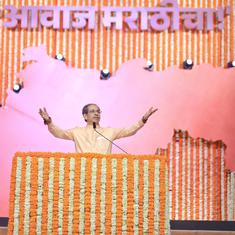In her memoir of loss, Learning to Make Tea for One, Andaleeb Wajid writes, “When 1st June arrived, I went to the hospital with a heavy heart once more. It was our twenty-fourth wedding anniversary. I tweeted that he was on the ventilator instead of being home with us … I got a barrage of wishes from people, and many said they were praying for him to get better.” On June 3, Wajid’s husband, Mansoor, breathed his last, one of the countless lives that were cut short by the brutal Delta wave of the COVID-19 pandemic that raged through the world, hitting India especially hard, in the summer of 2021.
The memoir takes us right back to those dreadful months when Death played Russian roulette and people, young and old, rich and poor, men and women, were indiscriminately snatched away from our midst with barely a warning. The pandemic was a great leveller; none were spared, but not everybody was equally impacted. Within a space of a couple of days, Wajid, who herself had tested positive and was hospitalised, lost her mother-in-law and her husband, and life as she knew it changed forever. Learning to Make Tea for One traces Wajid’s journey of navigating through devastating loss and coming to terms with a “new normal” – a phrase we use quite casually but one that marks the truth of Wajid’s life.
Grief is hard to process and even harder to articulate, and this makes the labyrinthine journey of negotiating it a very lonely one. This is ironic because grief is a universal emotion, one that every single one of us encounters in some shape or form at some point in life. But each grief is different and so is every experience of it, making it a shared but ultimately a lonely experience. The truth of this was perhaps most evident during the cruel pandemic, as its very nature made it impossible for us to reach out to one another at a time when we needed to do so the most. Perhaps there was also a sense of futility that accompanied those worst affected and prevented them from reaching out because as Wajid reiterates, ultimately, they were in it alone.
Wajid was surrounded by family, but as she remembers, the presence of familiar faces only heightened the absence of that one face she needed to see the most and was lost forever. Though Wajid writes about seeking help through grief counselling, perhaps for a writer, writing what must have been a painful reconstruction of the past, was possibly the best way of coming to terms with her irreparable loss.
Writing as recovery
Even as one turns the first few pages of the memoir, a couple of things stand out. The first is the surreal nature of those days of the pandemic when the most regular, natural order of things – the song of a cuckoo, buying groceries, a phone call from family or a friend, were the only sources of relief in troubled times. Wajid’s narration vividly brings alive a time when words such as “co-morbidities” and “saturation” became part of our everyday vocabulary, and one constantly lived in a state of mental fugue. The memoir also depicts the state of denial that Wajid lived in through those days, and perhaps, in some ways, continues to grapple with, possibly as a survival strategy.
The chapter titled “Everything is Fine” underlines this fact and it is only after one comes to terms with Mansoor’s death that the undeniable premise of this memoir is unequivocally articulated – something that Wajid is unable to state at the onset simply because of the immensity of her grief. The memoir tends to meander into the past, digress into anecdotes, mostly about ordinary, everyday things – the Friday ritual of making biryani, Mansoor’s love for Tamil songs and branded clothes, their shared love for notebooks – but like a refrain, the memoir keeps returning to the inescapable days and moments leading to Mansoor’s death. But it is also through these meanderings that Mansoor comes alive, and you get a glimpse of the person that he was, and the life that he shared with his wife, sons and his mother.
Loss is not something Wajid is unfamiliar with, having lost her father at the young age of 12, and two heartbreaking miscarriages she underwent before she had her youngest. But in many ways, the memoir also suggests that loss is what initiated Wajid into her journey of becoming a writer. Women’s writing across cultural and other divides has helped women recover a voice that is often silenced. Writing has therefore been a survival strategy adopted by women. Wajid does the same with her writing – the memoir illustrates how writing became a means of emancipation for a girl who was married young. It gave her a livelihood and a career that she could not have otherwise envisioned for herself. In one of her most widely read novels, More Than Biryani, a mother and daughter come to terms with the loss of the father and surviving without the privilege of education and financial independence. But unlike them, Wajid had both and the memoir takes forward the journey she had hesitantly embarked on. It’s now a journey that includes several romances, award-winning books for young adults and even a novel that has been adapted for the screen.
Beyond carrying on
Writing about grief isn’t easy, reliving trauma isn’t easy, and it certainly isn’t easy to let strangers read about it. But Wajid writes this memoir with searing honesty – she doesn’t hesitate to talk about a marriage between two very different personalities and how they settled into an easy companionship, of being assuaged by various kinds of guilt and making her peace with them, of her privilege that allowed her husband to have the best possible medical care while hundreds were gasping for breath, her not having to deal with the minutiae of life till she was in a better space, and so on.
There is also the danger in such a memoir of infringing upon the privacy of a person who is no longer around to consent to what is being said about him or her. But Wajid does it in a remarkably sensitive manner, sharing just enough about her husband to enable her readers to see him for the person that he was but never over-sharing. Similarly, one sees her and her children at their most vulnerable moments and yet those moments are described with a quiet dignity and not with melodrama. She makes no attempt to evoke a reader’s pity. What emerges is a story of quiet strength, of people dealing with the worst hand life can deal but soldiering on, even reclaiming some semblance of joy and demonstrating a resilience that life has a way of squeezing out of you.
Many years back, struggling with a personal loss, I had read Joan Didion’s The Year of Magical Thinking, a thoughtful gift from a dear friend. There was much in there that helped me to understand my own grief, but the opening scene of the parents sitting down for dinner, opening a bottle of wine while their daughter lay in the ICU of a hospital, left me with a sense of disconnect. Siddharth Dhanvant Shangvi’s Loss continues to sit on my bedside table because while he so movingly writes about loss, he also perceptively shares that “grief is not a record of what has been lost but of who has been loved.” But the real and raw feelings that Andaleeb Wajid’s memoir evokes made it difficult for me to read it without tears blurring the print, but it also held out gentle hope that tomorrow will be better, that tomorrow one will live again, laugh again, even thrive. And this is what makes Learning to Make Tea for One an inspiring, even therapeutic read.

Learning To Make Tea For One, Andaleeb Wajid, Speaking Tiger Books.










